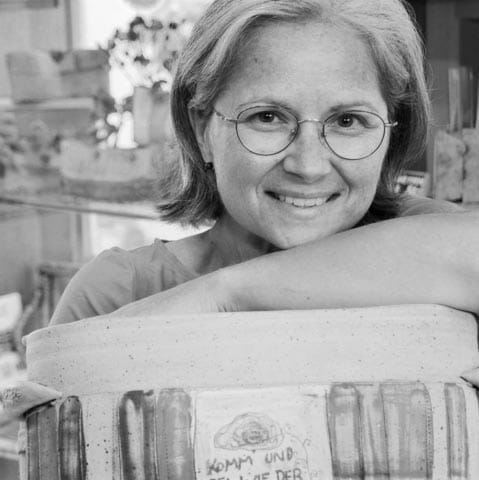
I am Elisabeth, a ceramic art teacher and designer of ceramic materials; I live and work in Stockerau, Austria. My workshop together with a small store is located in my home.
Even as a child I loved working with my hands, sewing, painting and making things. Later, professionally, I absolutely wanted to continue on this path and reserve for myself the joy of manual labor, so I eventually decided to become a ceramist. After graduating from high school, I started an apprenticeship in a company that made tiled stoves. There I learned how to work with ceramic mixtures, making stove tiles and tiles. I was able to acquire the basics of lathe work thanks to my tenacity, practicing in long night hours after work. After a few years as a skilled worker in the tiled stove workshop, I decided to go to Höhr-Grenzhausen in Germany and take a course at the State Institute to become a ceramic materials designer.
It was a revelation, a mecca, an enlightenment for me!
I was living in constant confrontation with ceramists from so many different countries, with their ideas and points of view; new worlds and new opportunities opened up to me, with the possibility of drawing fully from it all. It has been simply wonderful! In my final year of the course, I chose as my thesis topic "Happiness in Boxes" - boxes for dildos and vibrators. Of course, it was a bold and provocative topic, but I did the whole thesis project - the planning, design, development, mold making and product decoration up to the exhibition presentation - getting the degree for it. At the moment, however, I am more inclined to produce menstrual cup containers; these products are also in high demand.Following the design course, I took the master craftsman exam and now work independently, making tableware, tiles, plant pots and various orders. I use German stoneware, self-made engobes and transparent glazes. In decorating my pieces I always use printmaking techniques. Since drawing is one of my hobbies I also decorate the surfaces of my ceramics with drawings or small texts. I chose my two electric kilns (200 l and 38 l) for pragmatic reasons: you turn them on and it's done! In the area where I live there is a lot of construction and the use of wood-burning kilns is not allowed for safety reasons; a gas kiln would require a lot of attention and time - things that with two small children I didn't have available to me when I had to make up my mind.
During work I like to isolate myself, listen to beautiful music and sometimes forget about the world around me. In such an atmosphere, almost meditative, thoughts are able to fly and create something new. Working with clay opens up so many possibilities - I can always experiment with new techniques, shapes, colors and decorations. At first I doubted a bit, but now I really enjoy organizing courses and passing on my knowledge to interested people. I often notice that serious and well-organized courses are scarce; in many of them "pottery is made" without any knowledge of the material, its characteristics, being imparted. Transmitting notions and technical skills is instead, exactly what I think is important, so that not only "kiln bodies" are created, but the joy and enthusiasm of work is preserved. I find my inspiration in everything that surrounds me or happens around me, in the things or people I meet. I discover something new every day - and every day my curiosity is aroused. Then when I'm about to open a kiln after baking, I get a thrill from the result of my works. All this activity makes me so satisfied and accomplished that after 30 years I am still happy to be a potter.
CONTAINERS FOR MENSTRUAL CUPS
Commonly used sanitary napkins and tampons pollute, both in the production phase and in their disposal and can also cause allergies and infections. Beyond this, they cost a lot, considering the large number that every woman will consume during her fertile life. Instead, a single silicone cup, to simply be emptied and washed after each use, to be sterilized like a normal teat at the end of the cycle and to be stored in an elegant handmade ceramic container, represents for many women an alternative of ecological, economic and hygienic value, a truly "green" choice. Amalia Ferrigno
Amalia Ferrigno